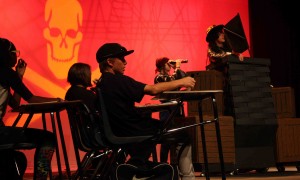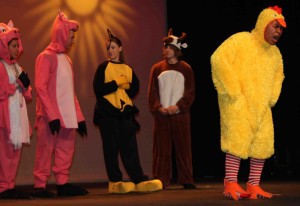I received an amazing email from a drama teacher in regards to a performance of one of my plays, HORROR HIGH. It inspired me to write a blog post for the Playscripts website, and I reprint it here.
I received this email from a drama coach who had directed a production of one of my plays.
“During the performance last night, one of the audience members was laughing so loud, I thought he had been drinking (haha). He approached me after the play was over. It was a community member who lost his wife to cancer last fall, and his son, Casey, is an extra in the play. He said that since his wife had passed, he had been unable to laugh – until he saw your play. For a couple hours, he was able to forget everything and just laugh. He wanted to know who wrote it. He plans on coming again Monday.
Well, his son is an understudy. When I told the cast what Casey’s dad said, the student for whom his is understudying decided to let Casey play Victor on Monday. It’s going to be a surprise for Casey’s dad. I’ll let you know how it goes!
Michelle Miles
FHS Drama Coach”
My response:
Dear Michelle and the cast and crew,
I can’t tell you how flattered I am to receive this email. Reading it reminded me of an exchange I had years ago with a really great improv teacher. I was bemoaning the fact that, because of the war, we had been adding more and more serious scenes into our graduation show. He asked me, “Why do you think people come to the theater?”
“To be entertained.”
“No, they come to be affected.”
I think most of us, when we realized we were destined to work in theater in some capacity, proceeded because we wanted to be part of entertaining audiences, and then, years later, we learned our relationship with the audience is a little more complicated than that.
Maybe the audience doesn’t think of it in those terms, but in truth they are there to be affected, manipulated, moved by the experience. Laughter is certainly part of that, but so are tears, anger, and heated conversations in the parking lot after the show dissecting the meaning of what they’ve just seen. We want to affect the audience, the audience wants to be affected. A perfect, symbiotic relationship.
But sometimes, sitting in that darkened theater, there is an audience member who doesn’t want to be affected. Sometimes that person needs to be affected.
A very smart actor with whom I often work once said, “The most important gifts you receive are the ones you give away.” Casey’s father has given you the most important gift someone in the theater can receive; He made what you do matter. And in turn, you gave him the gift of affecting him in the way he needed most at that moment. Many speeches are given by many theater practitioners about the importance, honor, and responsibility of the theatrical arts. I can’t think of a better example than this one. You never know when someone like Casey’s father will be out there, but you should always assume they are, and approach the stage as if tonight’s show can be a transformative experience.
(And just to be clear, I’m speaking of everyone involved in the show. Without the director, playwright, costumes, props, sets, lights, stage manager, running crew, or the person handing out tickets and programs, Casey’s father wouldn’t have had that experience.)
Speaking of gifts, I must applaud the actor who stepped aside so Casey could take his role for the evening. When you hear actors speak of other actors as “gifted” and “generous,” generally that refers to their onstage habits. Rest assured, your generosity and gifts were definitely on stage that night, even if you weren’t.
So, again, thank you for the email; thank you for choosing my show; and thank you for reminding me of what’s important about what we do.
Sincerely,
Sean Abley


